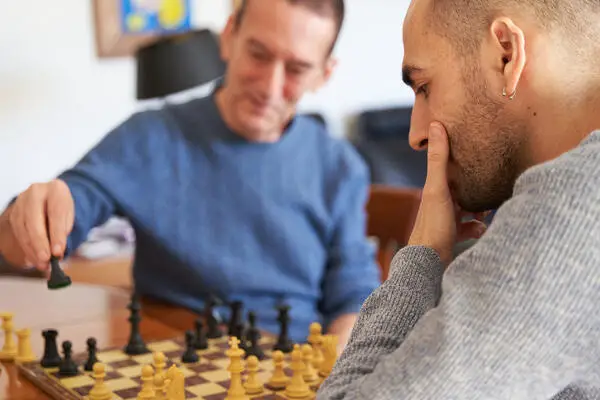
7 Ways To Cope With Age-Related Memory Loss
As we age, it's common to experience cognitive changes that can include memory loss. These changes can be attributed to various factors, including changes in the brain, changes in hormones, and lifestyle factors such as stress and lack of sleep. While these changes are a natural part of aging, accepting and coping with them can be challenging.
However, some strategies and techniques can help you or a senior loved one cope with age-related memory loss. In this blog post, we'll explore some of these approaches. Read on.
Keep The Brain Active
Memory loss is a common challenge for older adults, with research indicating that around 70% of those over 60 experience some degree of memory impairment. However, engaging in mentally stimulating activities can help maintain healthy cognitive function. When we participate in mentally challenging tasks, the brain creates new connections between neurons and reinforces existing ones, which helps maintain the brain's overall neural network. This is particularly important because some of these connections naturally decline as we age, so keeping the brain active can help counteract this process.
Additionally, mental stimulation doesn't just affect memory; it also benefits other aspects of cognitive health, such as attention, executive function, and information processing. By maintaining a healthy cognitive function in these areas, the brain is better equipped to compensate for age-related memory loss and other cognitive challenges.
Here are examples of activities that can help keep the brain active:
- Solving puzzles
- Playing games that require strategic thinking
- Reading
- Painting
These activities challenge the brain to think and process information in new ways, which contributes to maintaining cognitive health and preventing memory loss.
Treasure Those Memories: Document And Tell Your Story
Memory conservation for seniors can be particularly helpful for individuals with age-related memory loss, as it can help provide a sense of comfort and familiarity. Reminiscing about past experiences and events can also be a source of joy and entertainment for seniors, especially when shared with loved ones.
There are various ways to do this, such as writing, collecting snippets into memorabilia, and sharing stories. Once those memories are captured or printed into memory books that can be read repeatedly or shared, they can become a comforting tool to help you or your senior loved one revisit cherished moments and help improve short-term and long-term memory loss.
Eat A Brain-Healthy Diet
Eating a balanced diet rich in fruits such as berries, green leafy vegetables, whole grains, lean proteins like poultry or beans, and healthy fats such as those in fatty fish and olive oil can help support brain health.
Specifically, the Mediterranean Intervention for Neurodegenerative Delay (MIND) diet has been linked to a reduced risk of memory loss in middle-aged and older adults. However, it is important to note that while a healthy diet can benefit brain health, it is not a cure for memory loss or other cognitive impairments.
Here's a look at how the MIND diet is believed to help with age-related memory loss:
- Reducing inflammation: Many foods in the MIND diet contain anti-inflammatory compounds and antioxidants.
- Improving vascular health: The MIND diet helps promote heart health and lowers blood pressure, which is important for maintaining healthy blood flow to the brain.
- Supporting brain structure and function: The nutrients found in the MIND diet, such as omega-3 fatty acids, vitamins, and minerals, play essential roles in maintaining brain health and cognitive function.
Establish A Routine In An Organized Home Environment
Establishing a daily routine can provide structure and predictability for individuals with memory loss. This can help minimize confusion and make it easier to remember daily tasks. As such, consider sticking to a consistent sleep schedule, mealtimes, and daily activities.
Maintaining a home environment that minimizes confusion and promotes familiarity for individuals with memory loss can also help. This involves keeping important items in consistent locations, labeling drawers and cabinets, and using simple layouts and clear signage to reduce wandering.
Moreover, using organizational tools like calendars, to-do lists, and reminders can help you or your senior loved one stay on top of daily tasks. These tools can also reduce stress and anxiety associated with forgetfulness.
Rest And Don't Stress
Adequate sleep is essential for maintaining overall health and is particularly important for brain function. Therefore, sticking to 7-9 hours of sleep each night can help support cognitive health and minimize the impact of age-related memory loss.
In addition, chronic stress can hurt cognitive function and memory. So, stress management, such as practicing mindfulness, meditation, yoga, or relaxing hobbies like gardening or painting, can be helpful.
Maintain A Healthy Lifestyle
Maintaining a healthy lifestyle including socialization and regular exercise, is believed to help prevent the early onset of age-related memory loss.
For one, studies suggest that individuals with strong social networks were shown to have a lower risk of developing dementia. As such, scheduling regular get-togethers, joining clubs or community groups, and staying connected with your loved ones go a long way in promoting good brain health.
In addition, regular physical activity may help improve cognitive function and reduce the risk of its decline. So, aim to stick to an exercise routine or engage in activities such as walking, swimming, or gardening.
Seek Professional Help And Consider A Memory Care Home
If you or a family member is struggling with age-related memory loss, don't hesitate to seek professional help. Memory care facilities and support groups can provide better guidance, resources, and support to help you and your family navigate this challenging time.
Conclusion
Coping with age-related memory loss can be challenging for the individual experiencing it and their family and caregivers. However, there are things you can do to manage and cope. Moreover, with professional help, you can ensure the best care for you or your loved one to continue enjoying a fulfilling life.